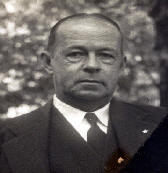
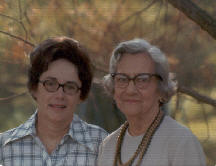
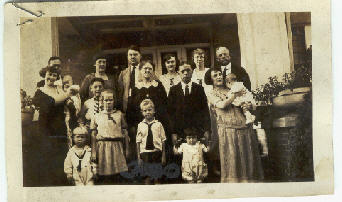
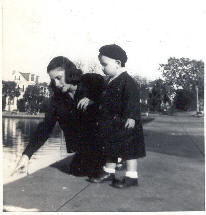
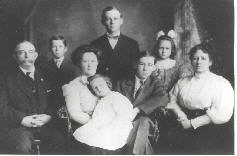



Walter F. McClure Family McClure Family 1923 Jeanne McClure Sanders with son Robert McClure Jeanne McClure Sanders & Helen Jackson McClure
On Confederate Memorial Day, April 1875, in ceremonies all over the South, people honored the memory of their brave soldiers. As they had sent every citizen able to bear arms to the front when their country called, so did they honor with reverent devotion the memory of the many noble sons who died on her behalf.
The hope of those who erected those first monuments to our Confederate dead was that those who came after them would say: “Our fathers fought for that which they deemed the right and were not dishonored traitors. The monuments bear testimony in their behalf – and are a protest to God and man of the righteousness of their cause and the purity of their motives. They are a vindication as well as a remembrance. That they speak to the world of a cause crushed but not disgraced, of a people vanquished but not dishonored. They commemorate the courage, the chivalry, the devotion of the dead and bear testimony to the justice of their cause. There will be no shame for the children of the conquered.” We should point with pride to our monuments, and say “so honored the South her heroes.” “In years to come the proudest patent of nobility which a Southern man can boast will lie in the words “my father fought for freedom in the ranks of the Confederate Army.”
Gen. Clement A. Evans on the occasion of laying the cornerstone of the Confederate Memorial at Augusta - spoke these honorable words:
“There are tears and honors for the slain without bitterness or hatred for the slayers. The hearts which thrilled under the remembrances of past glories and of surviving grief’s contain no feelings of resentment or of hostility for those who robbed us of our loved ones, who crushed our dearest hopes, who blighted our fondest aspirations. All is forgotten, or if remembered, there comes remembrance the softening recollection of their losses, the thought that they mourned their dead. We did not meet to swear hatred and vengeance upon the tombs of Southern soldiers; rather to declare to the North that while we honor and lament our dead we cherish no malice for the living. We say to them “here, across the graves of our sons and brothers, we extend to you the hand of peace and reconciliation. You believed in the justice of your cause, and battled for what you deemed the right. We believed in the justice of our cause, and battled for what we deemed the right. The God of Battles gave to you the victory. Let us, then, forget the enmities of the past, let us once more be friends and struggle together for the prosperity and glory of our common country. Victory has brought mourning as well as defeat. Your tears flow for the loved and lost. There are bruised hearts in the North as well as in the South. Let us have a mutual forgiveness, a common forgetfulness of wrongs.”
It was “eminently proper that the brave should speak of the brave; that the justice of the Lost Cause should be vindicated and its fallen defenders eulogized” by such a gallant soldier. While he spoke, with such eloquence which can only be inspired by feelings of the loyalty, of the valor, of the fortitude of the Confederate troops; there was another theme upon which he touched, and which found a ready response in the hearts of his listeners:
“Let us do nothing to keep alive the passions of war. To study its lessons is prudence, to profit by its teaching is wisdom, but to stir up the old animosities is madness. The voice of this monument will not be for war, but for peace. It will say to us, the Confederacy has expired. Its great life went out on the purple tide of blood that flowed from the hearts of its sons. We have buried it; we don’t intend to exhume its remains.
“We were utterly defeated, and we dismiss our resentments. Sadly we furled the dear, old banner of the cross of stars, which we followed through many a storm of shot and shell; but we take with the true hand of Southern honor the staff that holds the flag of the stars and stripes.”
The hope of those who erected those first monuments to our Confederate dead was that those who came after them would say: “Our fathers fought for that which they deemed the right and were not dishonored traitors. The monuments bear testimony in their behalf – and are a protest to God and man of the righteousness of their cause and the purity of their motives. They are a vindication as well as a remembrance. That they speak to the world of a cause crushed but not disgraced, of a people vanquished but not dishonored. They commemorate the courage, the chivalry, the devotion of the dead and bear testimony to the justice of their cause. There will be no shame for the children of the conquered.” We should point with pride to our monuments, and say “so honored the South her heroes.” “In years to come the proudest patent of nobility which a Southern man can boast will lie in the words “my father fought for freedom in the ranks of the Confederate Army.”
Gen. Clement A. Evans on the occasion of laying the cornerstone of the Confederate Memorial at Augusta -
“There are tears and honors for the slain without bitterness or hatred for the slayers. The hearts which thrilled under the remembrances of past glories and of surviving grief’s contain no feelings of resentment or of hostility for those who robbed us of our loved ones, who crushed our dearest hopes, who blighted our fondest aspirations. All is forgotten, or if remembered, there comes remembrance the softening recollection of their losses, the thought that they mourned their dead. We did not meet to swear hatred and vengeance upon the tombs of Southern soldiers; rather to declare to the North that while we honor and lament our dead we cherish no malice for the living. We say to them “here, across the graves of our sons and brothers, we extend to you the hand of peace and reconciliation. You believed in the justice of your cause, and battled for what you deemed the right. We believed in the justice of our cause, and battled for what we deemed the right. The God of Battles gave to you the victory. Let us, then, forget the enmities of the past, let us once more be friends and struggle together for the prosperity and glory of our common country. Victory has brought mourning as well as defeat. Your tears flow for the loved and lost. There are bruised hearts in the North as well as in the South. Let us have a mutual forgiveness, a common forgetfulness of wrongs.”
It was “eminently proper that the brave should speak of the brave; that the justice of the Lost Cause should be vindicated and its fallen defenders eulogized” by such a gallant soldier. While he spoke, with such eloquence which can only be inspired by feelings of the loyalty, of the valor, of the fortitude of the Confederate troops; there was another theme upon which he touched, and which found a ready response in the hearts of his listeners:
“Let us do nothing to keep alive the passions of war. To study its lessons is prudence, to profit by its teaching is wisdom, but to stir up the old animosities is madness. The voice of this monument will not be for war, but for peace. It will say to us, the Confederacy has expired. Its great life went out on the purple tide of blood that flowed from the hearts of its sons. We have buried it; we don’t intend to exhume its remains.
“We were utterly defeated, and we dismiss our resentments. Sadly we furled the dear, old banner of the cross of stars, which we followed through many a storm of shot and shell; but we take with the true hand of Southern honor the staff that holds the flag of the stars and stripes.”
A few weeks later General Evans responded to a Northern businessman’s letter regarding the reconstruction of the country: “A better understanding between the people of the North and South is securing fraternity In that restoration wise counsels will everywhere prevail. Political virtue will have an early resurrection, and the threatening financial clouds will break in the prospering showers. To thinking men of the whole country will join on the speedy cessation of all war-
At the same time, General W.H.H. Davis, commander of the Fourth Pennsylvania Regiment, paid tribute to the memory of all the comrades who fell in battle: “At the crossing of yonder streets stands their monumental stone, erected rather to perpetuate their courage and fidelity than to commemorate the civil feud in which the lost their lives. But while laying a tribute on the graves of our own dead, we can afford to drop a tear for the dead of the other side. They were our countrymen, and we should feel proud of their gallant deeds. Their courage and fortitude developed the highest type of American character; and in all the best qualities of a soldier the Confederate Gray proved himself the peer of the Union Blue. Our hearts should swell with charity toward them when we remember that but for the accident of success, Washington and Jefferson would have no greater claim to the name of patriot than Lee and Stonewall Jackson. I need not pause to tell you that the cause you served, and for which our comrades died, was just, for the judgment of the world has so decided. That “tis sweet to die for one’s country” is proved by the cheerfulness with which men lay down their lives in camp and court; and the altar of the country has claimed as many martyrs as the church. The lessons of patriotism are the most precious of all our teachings. There is one duty we should all cultivate – that of forgetfulness of the passions and hates of the war. Let us keep green the recollection of all the manly and noble qualities, everything that serves to ennoble and dignify human nature developed during the war, but let us forget everything else. Every good citizen should help to bind up the wounds of the war, and restore the old time harmony of good-
Our Southern women: “The women, ever foremost in deeds of charity and patriotism; who equipped their warriors for the field when the note of war was sounded; who kept alive the fires of patriotism during the darkest hours and gloomiest periods of the unequal struggle; who walked the wards of the hospitals and tended like ministering angels the couches of the fever-
The mounds in local cemeteries which covered the remains of the local soldiers who died from wounds or disease symbolized to them all the sons, the brothers, the fathers, the friends and lovers who went to their rest in other fields, and were a remembrance to them of the noble spirits and dauntless hearts who encountered death upon the field of honor. “Tenderly have they been watched; faithfully have they been cared for, and with every recurring anniversary of the death of the Confederacy – the sweetest flowers of Spring, bedewed with the tears of beauty weeping for the brave, have been strewn upon their graves.”
“Vanquished but Not Dishonored”
WOMAN
Not thine! Not thine! is the glittering crest,
The glance of the snow-
And the badge that gleams from the warrior’s breast,
A star ‘mid the battle’s gloom.
Nor is thy place amid the boat
Where the war-
Where waving plumes are like sea-
And the turf wears a gory stain.
Not there – not there – is thy glorious dower,
But a holier meed is thine;
Where the proud have fallen in triumph’s hour,
And the red blood flowed like wine –
To wipe the dew from the clammy brow,
To pillow the drooping head,
To cool the parch’d lips fevered glow,
And to smooth down the lowly bed.
Not thine – not thine – is the tow’ring height,
Where Ambition rears her throne –
The timid dove wings not her flight
Where the eagle soars alone!
But in the hall and in the bower,
And ‘round the humblest hearth,
Man feels the charm, and owns the power,
That fetters him to earth!
Southern Literary Messenger
In Honor of my Confederate GG-Grandfathers and uncles:
Manoah Bostick Hampton, II of Leighton, Alabama, my UDC ancestor
Granville T. Jackson of Ninety-Six, South Carolina
Thomas Newton Hopkins of Augusta, Georgia
My Confederate gg-uncles: Louis N., Armand, & Henry R. DeLaigle; Charles D. & Henry A. Watkins, and others.
Manoah Bostick Hampton, II of Leighton, Alabama, my UDC ancestor
Granville T. Jackson of Ninety-
Thomas Newton Hopkins of Augusta, Georgia
My Confederate gg-
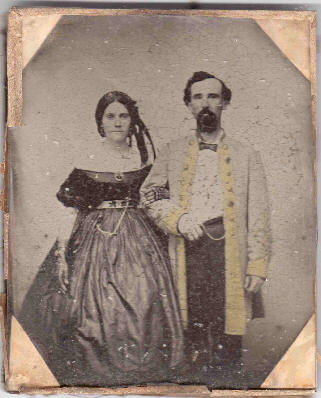
Granville T. Jackson of Ninety-Six, South Carolina with his wife Martha Jane Davis.
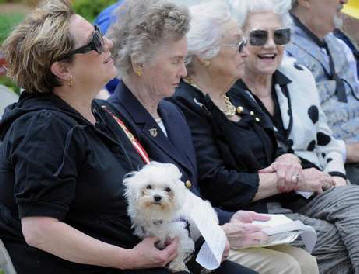
Bella (my little white Matlese pup. She is actually “Belle” but it’s easier to call her Bella) and I at Confederate Memorial Day celebration, Montgomery, AL. , 2010. The three ladies to my left are fellow members of John Pelham Chapter, #67, UDC. It was a lovely ceremony!